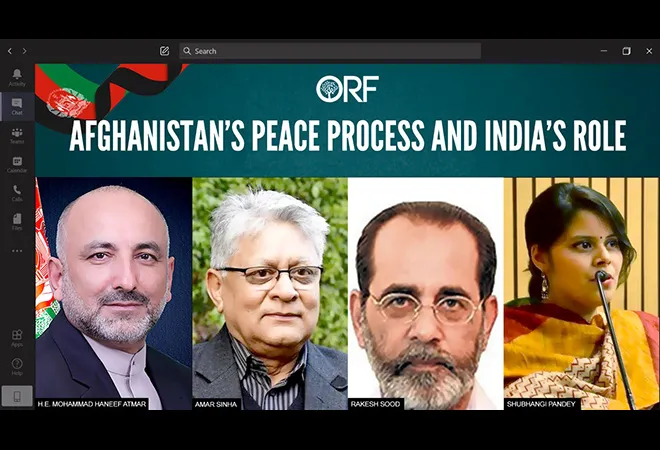The key is to achieve peace within the Islamic Republic of Afghanistan — a system that is defined by its core values related to human rights, women’s rights, democracy, rule of law and political inclusion.

On 23 July 2020, the Observer Research Foundation (ORF) organised a special digital conversation with H.E. Mohammad Haneef Atmar, the acting Minister of Foreign Affairs, Government of the Islamic Republic of Afghanistan. Titled ‘Afghanistan’s Peace Process and India’s Role,’ the webinar focused on the evolving status of intra-Afghan talks, prospects for reconciliation with the Taliban, and the role that India could play in the process, given its stakes in a sovereign, democratic, united and peaceful Afghanistan. Moderated by Shubhangi Pandey (Junior Fellow, Strategic Studies Programme, ORF), this important webinar also featured Amb. Amar Sinha (former Indian Ambassador to Afghanistan; Distinguished Fellow, RIS) and Amb. Rakesh Sood (former Indian Ambassador to Afghanistan; Distinguished Fellow, ORF).
The discussion began with Mr. Atmar giving an overview of the progress on the peace process front, since the signing of the February 2020 US–Taliban agreement aimed at the withdrawal of foreign troops from Afghanistan. He shared that the current government of Afghanistan was working towards uniting the Islamic Republic, to cultivate a national consensus in support of the peace process. He further elaborated that key political figures in Afghanistan had agreed that eventually the presidential election results will have to be accepted and an inclusive government will have to be formed. Moreover, since Afghanistan is a multi-ethnic country, there was agreement on building a high council of national reconciliation, an inclusive governmental body that would be representative of the aspirations of all Afghan men and women. This would ensure that those with no or little voice have a chance to be heard. Indirect, if not direct, engagement with the Taliban and with Afghanistan’s international partners would also be an important part of the reconciliation process, while staying cognizant of the primary security imperatives to do with reduction in violence and an orderly process of prisoner exchange, Mr. Atmar noted.
Mr. Atmar further highlighted the rationale for the peace process from the government’s perspective, explaining why peace is both, desirable and feasible for Afghanistan — a consensus that Afghanistan’s regional and international partners are also engaged with. The first point is to do with the cost of war being too high in blood, treasure and opportunities, not only for Afghanistan but for the region at large. Second, peace with the Taliban will be extremely important for counterterrorism at the regional and international levels. What Afghanistan is dealing with is a symbiotic relationship between national terror networks, transnational criminal networks on the other, and covert foreign policy engagement as the third element of that axis. The Taliban is known to have affiliations with regional terror outfits like Jaish-e-Mohammad (JeM), Tehrik-i-Taliban Pakistan (TTP), and international groups like Daesh and al-Qaeda. Third, peace in Afghanistan would improve political and security cooperation at the regional and global level. Fourth, peace in Afghanistan is important for regional economic cooperation, connectivity and stability to prosper and endure. So far, India has played a significant role in promoting regional connectivity through ventures like the Chabahar Port Project, which connects Afghanistan with Central Asia and India.
Thereafter, Mr. Atmar argued that to seek peace in Afghanistan, there must be clarity on the kind of ‘end state’ that Afghans, as well as Afghanistan’s regional and international stakeholders, would accept. In the end state, the key is to achieve peace within the Islamic Republic of Afghanistan — a system that is defined by its core values related to human rights, women’s rights, democracy, rule of law and political inclusion. Afghanistan also aims to be a center of cooperation in the region, not a battleground for confrontation among regional or global actors. Afghanistan seeks to be an independent, sovereign, unified state, with full territorial integrity and no foreign interference. In such an end state, constitutional democracy would be a non-negotiable and foreign relations would be pursued independent of any external pressures.
On India’s role in the peace process, Minister Atmar emphasized the need to preserve the longstanding partnership that New Delhi has developed with Afghanistan over the years, which is marked by open communication and cooperation on various fronts. He further highlighted the importance of India and Afghanistan being on the same page vis-à-vis the end state in Afghanistan, and work towards achieving a regional consensus on the same. The Afghan government will continue to seek India’s partnership on platforms like the Shanghai Cooperation Organisation (SCO) as well as bilaterally, on security and economic relations.
Thereafter, the interactive session that followed the Minister’s keynote address, focused on exploring the immediate repercussions of ramped up violence in Afghanistan, especially on the peace process. Minister Atmar pointed out that the situation was indeed highly volatile, with casualty figures as high as 100 a day, even as the Taliban claimed to be committed to the peace process. However, the demand for peace is at an all — time high, which would eventually yield stability, he contended. As for India’s engagement with the Taliban in the days to come, the Minister recommended that all action be made conditional on the advancement of peace and towards the achievement of the desired end-state.
This report is prepared by Rhea Sinha, Research Intern, ORF.
The views expressed above belong to the author(s). ORF research and analyses now available on Telegram! Click here to access our curated content — blogs, longforms and interviews.




 PREV
PREV


